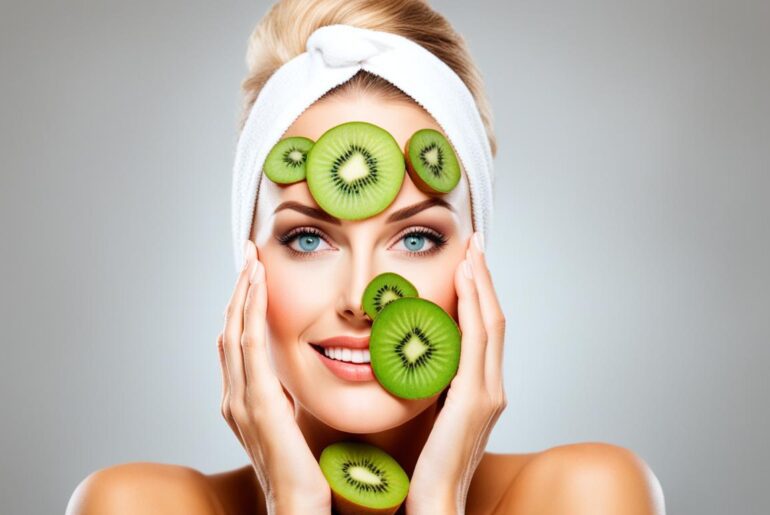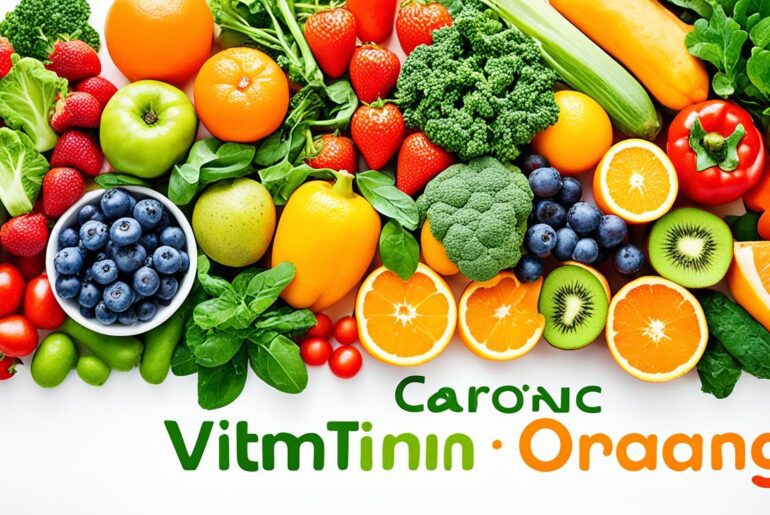Are you searching for the fountain of youth? Wondering how to keep your skin looking youthful and radiant as the years go by? Look no further! In this article, I will reveal the powerful benefits of vitamins for maintaining skin youthfulness. You may be surprised to learn that the key to ageless beauty lies within these essential nutrients.
From vitamin E to vitamin K, each vitamin plays a unique role in preserving the health and appearance of your skin. Together, they can combat the signs of aging, protect against sun damage, and promote a more youthful complexion. But are oral vitamins enough? Or do you need to apply them topically? Let’s dive deeper into this intriguing topic and unravel the secrets to maintaining healthy, youthful skin.
Key Takeaways:
- Vitamins such as vitamin E, vitamin C, vitamin A, vitamin D, vitamin B, and vitamin K are essential for maintaining youthful and healthy skin.
- Topical application of vitamins through creams and ointments is more effective in delivering these nutrients directly to the skin.
- Excessive intake of certain vitamins can have negative effects on the body, so it’s important to find the right balance.
Vitamin E for Skin
Vitamin E is a powerful antioxidant that offers numerous benefits for the skin. As an antioxidant, it helps protect the skin from the harmful effects of free radicals, which can damage cells and accelerate the aging process.
One of the key benefits of vitamin E is its ability to hydrate the skin and improve moisture levels. This vitamin has moisturizing properties that can help alleviate dryness and roughness, leaving the skin soft and supple.
When it comes to sourcing vitamin E, incorporating nuts and seeds into your diet is a great way to ensure an adequate intake. Almonds, sunflower seeds, and spinach are rich sources of vitamin E that can be easily included in your meals or as snacks.
In addition to dietary sources, topical creams containing vitamin E can be applied directly to the skin for added hydration and healing benefits. These creams can be especially beneficial for individuals with dry or damaged skin.
The Benefits of Vitamin E for Skin
“Vitamin E is an essential nutrient for maintaining healthy skin. Its antioxidant properties protect the skin from damage caused by environmental factors and promote hydration, leaving the skin looking youthful and revitalized.”
Vitamin E has numerous benefits for the skin:
- Protection from sun damage: Vitamin E helps protect the skin from UV radiation and reduces the risk of sunburn.
- Moisturization: This vitamin helps improve skin moisture levels and prevent dryness, leaving the skin smooth and supple.
- Scar healing: Vitamin E can assist in the healing of scars and reduce their visibility.
- Anti-inflammatory properties: It helps soothe inflammation and calm irritated skin.
- Anti-aging effects: Vitamin E can help minimize the appearance of wrinkles, fine lines, and age spots.
Using skincare products that contain vitamin E can offer these benefits and contribute to overall skin health.
Vitamin E: A Reliable Ally for Skin Health
| Benefits | Sources |
|---|---|
| Protects the skin from sun damage | Nuts (almonds, hazelnuts), sunflower seeds, spinach, avocado |
| Improves skin moisture levels | Wheat germ oil, sunflower oil, almonds, spinach |
| Aids in scar healing | Tomatoes, sunflower seeds, spinach, almonds |
| Reduces inflammation | Sunflower oil, almonds, spinach, avocado |
| Minimizes the appearance of wrinkles and fine lines | Almonds, spinach, sunflower oil, hazelnuts |
Vitamin C for Skin

Vitamin C is an essential nutrient that offers numerous benefits for the skin. As a powerful antioxidant, it plays a crucial role in collagen production, a protein responsible for maintaining the skin’s elasticity and firmness.
By promoting collagen production, vitamin C can help reduce the appearance of wrinkles and fine lines, giving the skin a more youthful and vibrant look. It also aids in repairing damaged skin cells and can help fade hyperpigmentation and dark spots.
In addition to its anti-aging properties, vitamin C also acts as a shield against environmental stressors, such as harmful UV rays and pollution. It helps protect the skin from free radicals, which can damage cells and lead to premature aging.
There are several sources of vitamin C that you can incorporate into your skincare routine. Citrus fruits like oranges, lemons, and grapefruits are rich in this vitamin and can be consumed or used in homemade face masks for a natural boost. Topical creams and serums containing vitamin C are also widely available and can be applied directly to the skin for maximum benefits.
Here’s a breakdown of vitamin C sources:
| Food Sources | Approximate Vitamin C Content (per 100g) |
|---|---|
| Oranges | 53.2 mg |
| Strawberries | 58.8 mg |
| Kiwi | 92.7 mg |
| Red Bell Peppers | 128 mg |
| Kale | 93.4 mg |
Remember, a well-rounded skincare routine should include vitamin C to target various skin concerns and maintain a healthy complexion. Whether you choose to consume it through food or apply it topically, vitamin C is a valuable addition to any skincare regimen.
Vitamin A for Skin
Vitamin A, also known as retinol, is an antioxidant that plays a crucial role in maintaining skin health. It has numerous benefits for the skin, including protecting it from sun damage and promoting cell turnover. By promoting cell turnover, vitamin A helps to rejuvenate the skin, resulting in a smoother and more even complexion.
The key benefits of vitamin A for the skin are:
- Smoothing and evening out the skin tone
- Reducing blemishes and acne
- Improving overall skin texture
Vitamin A is available in different forms and strengths. Over-the-counter topical creams containing vitamin A can be easily incorporated into skincare routines. These creams typically contain retinol, which is converted into retinoic acid by the body. Retinoic acid is the active form of vitamin A that provides the skin with its benefits.
Stronger formulations of vitamin A, such as tretinoin, can be obtained with a prescription. These prescriptions are typically recommended for more severe skin concerns, as they provide higher concentrations of retinoic acid.
Retinol Creams for Skin
Retinol creams are a popular option for incorporating vitamin A into a skincare routine. They are widely available and can be easily purchased from drugstores, beauty retailers, and online platforms. When choosing a retinol cream, it is important to consider the concentration of retinol, which is often indicated on the product packaging.
“Retinol creams containing vitamin A can help smoothen the skin, even out the complexion, and improve overall skin texture.” – Dermatologist Dr. Emily Collins
It is recommended to start with a lower concentration of retinol and gradually increase the strength as the skin becomes accustomed to the ingredient. This gradual approach helps to minimize potential side effects, such as redness and dryness.
| Product | Retinol Concentration | Suitable for |
|---|---|---|
| Brand A Retinol Cream | 0.5% | Beginners |
| Brand B Retinol Cream | 1% | Intermediate Users |
| Brand C Retinol Cream | 2% | Advanced Users |
It is important to note that vitamin A, particularly in its stronger formulations, can increase the skin’s sensitivity to sunlight. Therefore, it is essential to wear sunscreen daily when using vitamin A products and to follow a consistent skincare routine that includes proper cleansing and moisturization.
In conclusion, vitamin A, or retinol, is a powerful antioxidant that offers numerous benefits for the skin. It helps protect the skin from sun damage, promotes cell turnover, and improves skin texture. Retinol creams containing vitamin A are widely available over-the-counter and can be easily incorporated into skincare routines. By starting with a lower concentration and gradually increasing the strength, individuals can enjoy the benefits of vitamin A while minimizing potential side effects.
Vitamin D for Skin

Vitamin D plays a crucial role in maintaining overall skin health. It is an essential nutrient that helps regulate skin cell growth and repair, ensuring the skin stays healthy and vibrant. In addition to its role in skin health, vitamin D also offers various benefits for the body, including supporting bone and immune system function.
To achieve optimal levels of vitamin D, it’s important to include both sun exposure and dietary sources in your routine. When exposed to sunlight, our bodies can produce vitamin D naturally. Spending a few minutes in the sun each day can help increase vitamin D production.
However, it’s equally important to obtain vitamin D from food sources. Some of the best food sources of vitamin D include:
- Low-fat dairy products, such as milk and yogurt
- Fatty fish, like salmon and tuna
- Eggs, particularly the yolks
Incorporating these foods into your diet can help ensure an adequate intake of vitamin D, supporting both your skin and overall well-being.
For those who have limited sun exposure or struggle with obtaining enough vitamin D from food sources, supplements can be a convenient option. Vitamin D supplements are widely available and can provide the necessary levels of this essential nutrient.
With its role in skin cell growth, repair, and overall health, vitamin D is an indispensable vitamin for maintaining optimal skin health. By combining regular sun exposure, consuming vitamin D-rich foods, and considering supplements if needed, you can support your skin’s vitality and enjoy all the benefits that vitamin D has to offer.
Vitamin B for Skin
Vitamin B, specifically niacin, is a powerful ingredient commonly used in skincare products to promote healthy skin. Its benefits for the skin are numerous, making it a key component in maintaining optimal skin health. Niacin helps improve the overall texture of the skin, reducing dryness and smoothing its appearance. Additionally, niacin increases the lipid content in the skin, which helps improve moisture levels, resulting in a hydrated and supple complexion.
One of the key advantages of niacin is its ability to treat various skin conditions, such as eczema. Its anti-inflammatory properties help reduce redness and irritation, calming and soothing the skin. Niacin also supports the skin’s barrier function, strengthening its ability to defend against external aggressors and maintain its natural protective barrier.
Incorporating niacin into your skincare routine can lead to significant improvements in the overall health and appearance of your skin. Look for skincare products that contain niacin or niacinamide, a form of niacin, to experience its remarkable benefits firsthand.
Vitamin K for Skin

When it comes to maintaining healthy skin, vitamin K plays a crucial role in the body’s clotting process and wound healing. But did you know that it also offers several other benefits for your skin’s appearance? From reducing the appearance of stretch marks and spider veins to lightening dark spots and scars, vitamin K can be a valuable addition to your skincare routine.
One way to harness the power of vitamin K is through topical products. These creams and ointments containing vitamin K can be directly applied to the skin, helping to reduce swelling and promote the healing of wounds. Say goodbye to unsightly bruises and hello to a more even-toned complexion.
But what if you prefer to incorporate vitamin K into your diet? Look no further than leafy greens like kale, spinach, and green beans. These vibrant vegetables are not only rich in vitamin K but also provide a host of other essential nutrients for overall skin health.
Vitamin K Food Sources
| Food | Vitamin K Content (mcg per 100g) |
|---|---|
| Kale | 817 |
| Spinach | 483 |
| Green Beans | 37 |
As you can see, incorporating vitamin K-rich foods into your diet is a delicious and nutritious way to support your skin’s health. So go ahead and indulge in those leafy greens!
Selecting the Right Skin Care Products
When it comes to selecting skin care products, there are several factors to consider that go beyond catchy marketing claims. It’s essential to look beyond the promises on the label and delve into the ingredients, pricing, and potential interactions with other medications.
Many products tout the inclusion of vitamins for skin care, but it’s important to ensure they contain effective concentrations of these nutrients. The right combination of vitamins can provide numerous benefits to the skin, including hydration, collagen production, and protection against environmental damage.
However, not all skin care products deliver on their promises, and some may contain insufficient amounts of vitamins to have any real impact on the skin. To make an informed decision, it is recommended to consult with a dermatologist or pharmacist who can provide expert guidance tailored to your individual skin care needs. Their knowledge and expertise can help steer you towards the best vitamins and products for your specific concerns.
By consulting with a dermatologist, you can gain valuable insights into the specific vitamins that your skin needs and receive personalized recommendations for the most effective skin care regimen. They can help you identify the vitamins that address your unique skin concerns, such as aging, acne, dryness, or hyperpigmentation.
In addition to consulting with a dermatologist, it’s crucial to be mindful of your skin type and any existing skin conditions. Certain products or ingredients may be more suitable for oily, dry, or sensitive skin, and a dermatologist can help you navigate those considerations.
Furthermore, professionals in the field of dermatology are familiar with the latest research and advancements in skin care, including new formulations and technologies. Their expertise ensures that the products you choose are backed by scientific evidence and have undergone rigorous testing for safety and efficacy.
Ultimately, selecting the right skin care products is a crucial step in maintaining healthy, vibrant skin. By consulting with a dermatologist and choosing products containing the right vitamins in effective concentrations, you can optimize your skin care routine and achieve the best possible results.
Conclusion
Vitamins play a crucial role in maintaining youthful and healthy skin. Vitamins E, C, A, D, B, and K are all important for different aspects of skin health. Vitamin E helps protect the skin from sun damage and improves hydration. Vitamin C promotes collagen production and reduces the appearance of wrinkles. Vitamin A, also known as retinol, improves skin texture and tone. Vitamin D regulates skin cell growth and repair. Vitamin B, particularly niacin, smooths the skin and reduces dryness. Vitamin K aids in wound healing and reduces the appearance of scars and dark spots.
While oral vitamins provide some benefits, topical creams and ointments are more effective in delivering these vitamins directly to the skin. It is important to choose skin care products that contain effective concentrations of vitamins. Consulting with a dermatologist can help you determine the best vitamins and products for your individual skin care needs.
Remember to maintain a balanced diet and adopt healthy lifestyle habits for overall skin health. Taking care of your skin goes beyond just using vitamins and products. By nourishing your body from the inside out, you can enhance the benefits of topical treatments and achieve the radiant, youthful skin you desire.
FAQ
What are some vitamins that are essential for maintaining youthful and healthy skin?
Some essential vitamins for healthy skin include vitamin E, vitamin C, vitamin A, vitamin D, vitamin B, and vitamin K.
How can vitamin E benefit the skin?
Vitamin E is an important antioxidant that helps protect the skin from sun damage, hydrates the skin, and improves moisture levels. It can be obtained through diet or applied topically through creams.
What role does vitamin C play in maintaining healthy skin?
Vitamin C is a powerful antioxidant that promotes collagen production, reducing the appearance of wrinkles and fine lines. It also helps protect the skin from UV rays. It can be obtained through citrus-based foods, supplements, and topical creams.
What are the benefits of vitamin A for the skin?
Vitamin A, also known as retinol, protects the skin from sun damage, promotes cell turnover, and improves skin texture and tone. It is available in topical creams and can be obtained with a prescription for stronger formulations.
How does vitamin D contribute to skin health?
Vitamin D regulates skin cell growth and repair, evens out skin tone, and can help treat conditions like psoriasis. It can be produced by the body when exposed to sunlight and is also found in certain foods or can be taken as a supplement.
What benefits do vitamin B provide for the skin?
Niacin, a form of vitamin B, helps smooth the skin, reduce dryness, and treat conditions like eczema. Pantothenic acid, another form of vitamin B, keeps the skin moisturized and reduces inflammation, making it effective for reducing redness and irritation.
How does vitamin K contribute to maintaining healthy skin?
Vitamin K plays a role in the body’s clotting process and aids in wound healing. It can reduce the appearance of stretch marks, spider veins, dark spots, and scars. It can be obtained from leafy greens or applied topically through creams.
How should I select the right skin care products?
When selecting skin care products, consider the ingredients, pricing, and potential interactions with other medications. It’s important to choose products that contain effective concentrations of vitamins and consulting with a dermatologist can provide personalized recommendations.
What should I keep in mind when choosing vitamins for skin care?
It is important to select skin care products that contain effective concentrations of vitamins and consult with a dermatologist for personalized recommendations. Also, maintaining a balanced diet and engaging in healthy habits is essential for overall skin health.




